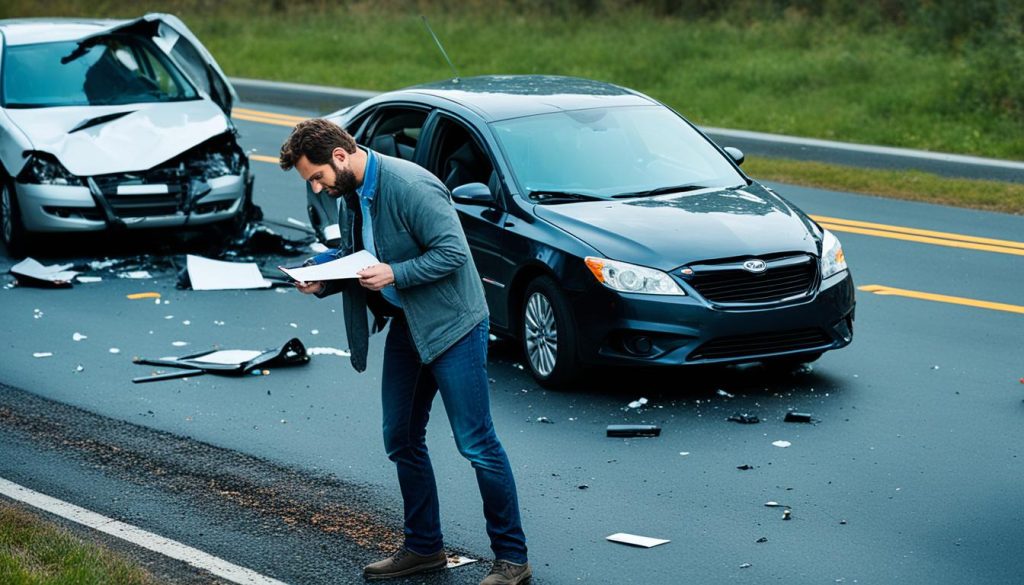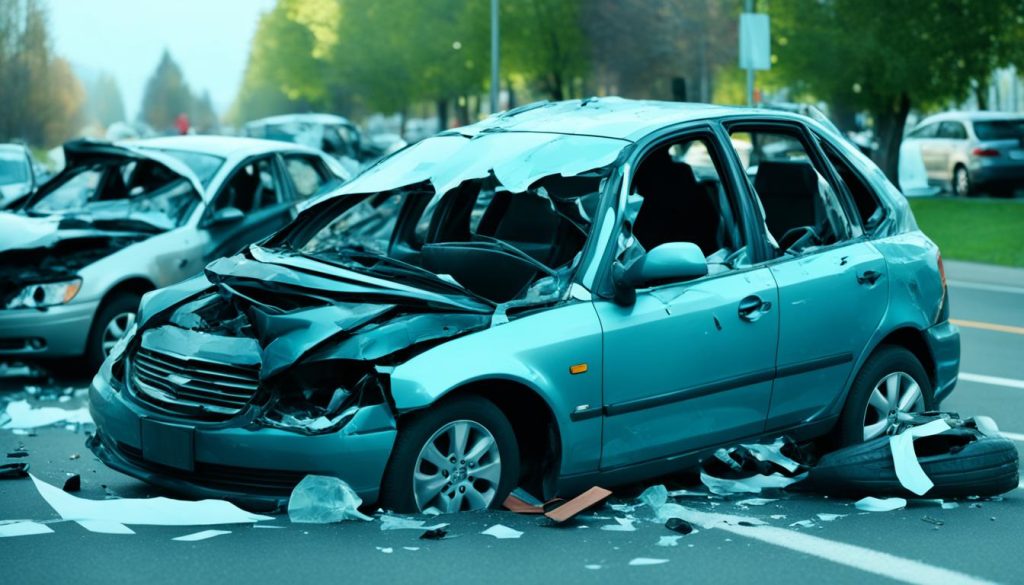If you’ve been in a car accident, knowing your legal rights is key to protecting your health and money. This guide will walk you through what to do first, what info to keep, and how to handle insurance claims and legal steps. It’s vital whether you were driving, riding, or walking when it happened. Understanding your rights can protect your health and help you get fair compensation1.
Right after a car accident, make sure to protect your rights. First, report the accident if it caused injuries or over $500 in damage, as Georgia law says1. Also, get medical help quickly because some injuries might not show up right away1. Having witnesses can also make your claim stronger1.
It’s key to document everything about the accident and your talks with others or insurance companies. Write down all the details, conversations, and important events1. Getting repair estimates from 2-3 mechanics helps figure out the damage’s value1. And, keep up with your medical treatment to avoid losing your claim1.
Insurance companies might try to deny your claim, even if you’re hurt1. Having a skilled car accident lawyer can help you get a good settlement and stop insurers from taking advantage of you1. Being professional and polite with insurance companies can also help your claim1.
Key Takeaways
- Understand your legal rights and obligations after a car accident
- Take immediate steps to document the accident scene and your injuries
- Seek prompt medical attention and follow through with treatment
- Be cautious when dealing with insurance companies and consider hiring an attorney
- Remain professional and polite to improve the likelihood of a favorable claim outcome
Immediate Steps to Take After a Car Accident
When you’re in a car accident, stay calm and follow the right steps to keep you safe and protect your rights. First, stop your car in a safe spot without blocking traffic2. Then, turn on your hazard lights and use flares or triangles to warn other drivers2.
Stop Your Vehicle and Warn Oncoming Traffic
If your car can still move, pull over to the side or a parking lot2. Don’t stop in the road to avoid danger to you and others. Once parked, turn on your hazard lights to signal the accident2. You can also set up warning triangles or flares around your car2.
Provide Aid to the Injured
If someone is hurt, help them if you can. But don’t try to give advanced first aid unless you know how2. Call for emergency help right away and wait for medical experts2. Stay calm and give the 911 operator details like where you are and what injuries there are3.
Call the Police
Always call the police, even if the accident seems minor2. They’ll make an official report that’s key for insurance or legal matters2. Tell the dispatcher where the accident happened, any injuries, and what happened3. Stay at the scene until police get there and answer their questions2.
These steps after a car accident help keep you safe, document what happened, and prepare for insurance or legal actions2. What you do right after can greatly affect your case’s outcome3.
“In a car accident, keep safety gear like a flashlight and safety vest, a first aid kit, insurance and registration, and contact info for your insurance company, pen and paper, and a camera.”2
These steps can guide you through a car accident’s aftermath with confidence, aiming for the best outcome for your situation3.
Exchanging Information and Documenting the Scene
After a car accident, it’s key to swap important info with the other driver(s). Share your name, contact info, driver’s license number, and insurance details4. In Missouri, you must share insurance info, stay at the scene, and follow police instructions4. Apps from insurance companies have made sharing info easier and faster4.
Also, collect the details of any witnesses who saw the crash5. Their stories are vital for claims and legal cases; lawyers can help get these statements5. Take photos of the damage, skid marks, and the scene itself5. Footage from nearby businesses can prove who was at fault; act fast as it might not last5.
Seek Medical Attention
Getting medical help, even for small injuries, is key after a crash. It makes a record of your condition for insurance or legal cases later45. Quick medical checks are important as some injuries might not show right away, leading to serious issues if ignored5. Writing down what happened after the accident in a journal keeps important facts safe and strengthens your case5.
Remember5, calling 911 is the quickest way to report an accident and get help5. Police reports are key evidence in legal fights over who was to blame and how much damage was done5.
| Action | Importance |
|---|---|
| Exchange Information | Mandatory in Missouri, helps with insurance claims and legal proceedings |
| Gather Witness Statements | Can be crucial for claims and legal matters, legal counsel can assist |
| Document the Accident Scene | Photographs, videos, and physical evidence help establish liability |
| Seek Medical Attention | Creates a record of injuries, some may not be immediately apparent |
Using mobile tools and getting legal advice can make exchanging info, documenting the scene, and filing claims easier45. The Charbonnet Law Firm, LLC offers legal support after car accidents, reachable through their website or at (504) 294-3910 for help with injuries5.

By taking these steps and documenting the accident well, you protect your rights and ensure a fair outcome for your claim456.
Rights,Car Accident
After a car accident, you have important legal rights. These rights help protect your interests and ensure you get fair compensation. In Georgia, these rights are based on specific laws and rules about liability, negligence, and compensation7.
Georgia uses an at-fault system for car accidents. This means the driver who caused the accident is responsible for the damages8. This includes paying for medical bills, lost wages, property damage, and sometimes even pain and suffering8.
- Georgia requires drivers to have insurance with a minimum of $25,000 per person and $50,000 per accident for bodily injury. They also need $25,000 per incident for property damage9.
- If the at-fault driver doesn’t have enough insurance or has no insurance, you might get compensation from your own policy’s uninsured/underinsured motorist coverage8.
- Georgia has a modified comparative negligence rule. This means you can still get compensation even if you’re partly to blame for the accident8. But, your compensation will be reduced by how much you’re to blame.
You can also seek compensation from other sources, like medical payments (MedPay) coverage. This can help pay for your medical bills, no matter who was at fault7. But, MedPay coverage is not required in Georgia. So, it’s key to check your policy or the at-fault driver’s policy7.
| Compensation Type | Description |
|---|---|
| Medical Expenses | Covers hospital bills, medications, therapy, and other medical costs related to the accident8. |
| Lost Wages | Includes compensation for missed work, future income loss, and missed career opportunities8. |
| Property Damage | Covers the cost of repairing or replacing your vehicle, as well as any diminished value8. |
| Pain and Suffering | Compensates you for the emotional and physical distress caused by the accident8. |
| Wrongful Death | Allows family members to seek damages in the event of a fatal car accident8. |
| Punitive Damages | Can be awarded in cases of malice, wantonness, fraud, or willful misconduct8. |
The statute of limitations for personal injury claims in Georgia is two years from the accident date8. This means you have two years to take legal action and seek compensation9. Getting advice from an experienced car accident lawyer can greatly help you get the compensation you deserve8.
“Protecting your rights after a car accident is crucial to ensuring a fair outcome and securing the compensation you deserve.”
Understanding your rights as a car accident victim in Georgia is key to navigating the legal process and getting the compensation you deserve7. By taking the right steps and getting professional advice, you can focus on recovering while protecting your interests7.
Filing Insurance Claims and Legal Actions
After a car accident, it’s key to know how to file insurance claims and look at your legal options. Tell your insurance company about the accident right away, even if the other driver was to blame10. Also, make sure to file any needed accident reports with the right authorities on time11.
Notify Your Insurance Company
Telling your insurance company quickly is a must. They will help you with the claims process and protect your interests10. Keep in mind, many insurance claims get turned down at first, so don’t give up and make sure to give all the needed documents10.
File Accident Reports
In some states, you must file an accident report with the police11. This report is key evidence if you want to take legal action. Don’t forget to get a copy of the report for your files.
Understand Statutes of Limitations
Each state sets its own time limits for taking legal action11. For example, in Connecticut, you usually have two years to file a car accident claim11. It’s vital to know the laws in your state to avoid missing deadlines.
If the insurance company’s final offer is way off from what you think your case is worth, you might need to sue12. Trying mediation or arbitration can also be an option to save time and money and get more of your settlement12.
Getting a lawyer with experience in car accident cases is crucial when deciding if you should sue12. They know how to value cases, understand claim practices, and know what to expect in car accident cases12.

Knowing your rights and the steps for filing claims and legal actions helps you deal with the complex process of getting compensation after a car accident101112.
Conclusion
Knowing your rights and what to do after a car accident helps protect you and get the compensation you deserve13. Always put safety first, document what happened, get medical help, file insurance claims, and know the legal deadlines13. With the right steps, you can handle the aftermath of a car accident and get a fair result.
14 Things like eyewitness stories, police reports, photos, medical records, expert advice, and digital evidence can boost your legal action14. Using these can help you get the compensation you need for your injuries and losses.
15 A car accident can be tough, but being informed and active is crucial15. Knowing your rights and what to do next can help you go through the legal and insurance steps well. This way, you can get a good outcome for your case.
FAQ
What are the immediate steps to take after a car accident?
First, stop your vehicle safely without blocking traffic. Turn on your hazard lights and use flares or reflectors to warn others. If someone is hurt, help them but don’t try advanced first aid unless you know how.
Call the police right away to report the accident. They will make an official report that is important later.
What information should I exchange and document at the accident scene?
Swap insurance and contact info with the other driver. Also, get the details of any witnesses who saw the accident. Take photos of the damage, skid marks, and the scene itself.
Even if you’re not badly hurt, get medical help. This creates a record of your injuries that can help your insurance claim or legal case later.
What are my legal rights following a car accident?
You have the right to seek compensation for injuries, damage to your property, lost wages, and other losses. This might mean filing a claim with the other driver’s insurance or taking legal steps if they were careless. Knowing your rights helps protect your interests and get a fair outcome.
What should I do regarding insurance claims and legal actions?
Tell your insurance company about the accident right away, even if the other driver was to blame. Make sure to file any accident reports with the authorities on time. Learn about the time limits for legal action, as you can’t wait too long to seek damages.
Source Links
- What Can I Do To Protect My Rights After a Car Accident? | John Foy
- 7 Steps To Take After a Car Accident | Bankrate
- What to Do After a Car Accident
- NGK Law Firm
- PERSONAL INJURY LAWYERS
- What Should You Document Immediately After a Car Accident? – CDH Law PLLC
- Georgia Car Accident Laws – What You Need to Know | The Pendergrass Law Firm, PC
- What You’re Entitled to After a Car Accident in Georgia
- Georgia Car Accident Laws (2024 Guide)
- Insurance Claims & Asserting Your Legal Rights
- Auto Accident Compensation, CT Law Firm | Salomone & Morelli
- Should I File a Car Accident Lawsuit?
- Meeting the Burden of Proof in a Car Accident Case
- 6 Types of Evidence You Need to Prove a Car Accident Case
- The Importance of Gathering Evidence After a Car Accident – Car Accident Lawyer Orlando FL | Personal Injury Attorney in Orlando

